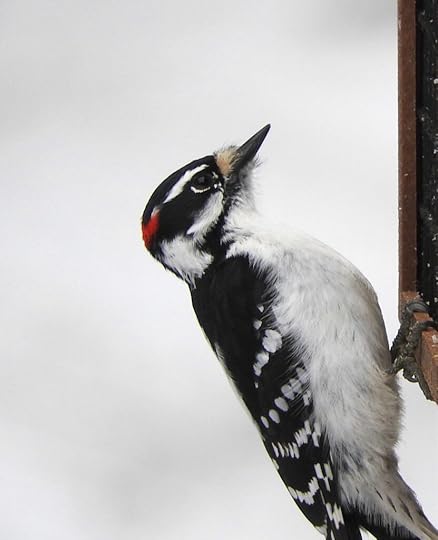Is Order Stable in the Great Chain of Being?
After the last of our four dogs passed away some years ago, we decided to share our lives with animals that didn’t require so much maintenance. Now my laptop sits on our dining room table from where I can see our patio where we tend to our “outdoor pets”, mainly birds, including wrens, finches, robins, cardinals, blue jays, nuthatches, thrushes, hummingbirds, mourning doves, starlings, Carolina chickadees, black capped chickadees, junkos, song sparrows, chirping sparrows, pileated woodpeckers and downy woodpeckers. From the woods just beyond, we also attract squirrels, possums, raccoons, stray cats and chipmunks (which are the only ones that terrify me since the time one got into the house and ran around chewing the woodwork for a couple of days). Our pets build nests along the edge of the woods, generally taking care of themselves, though once I rescued a fallen baby robin.
We’ve had much time to observe habits of different species and the pecking order they’ve established. Mourning doves are the sweetest, slowest, most ungainly and most polite, quietly feeding off the ground and taking baths. No one bothers to peck at them since they don’t seem to question their lowest rank.
As for who’s at the top, we took for granted that no one messes with the downy woodpecker that can aim its beak and move its head like a pneumatic drill. But in the past few days, the sparrows have gone after the woodpecker and the woodpecker defers and patiently waits.
This brought to mind high school English where, while studying Shakespeare, we learned about the Elizabethan notion of a “great chain of being”, a pecking order supposedly of a spiritual hierarchy topped by God, angels and kings. Darwin applied the scientific interpretation by proclaiming survival of the fittest among species. I wouldn’t go so far as to say a downy woodpecker is spiritually superior to a sparrow (I suspect mourning doves are the most spiritually attuned), but it definitely has a head that serves as a more powerful weapon than that of a sparrow.
In the U.S. we’re reminded every day that whatever order and hierarchy is supposed to exist has been bulldozed into a swamp. We’re not just in a pandemic but also hurtling toward election day where voters will decide whether we slide further into totalitarianism or climb back onto a path of democracy.
Maybe the answer to the woodpecker vs. sparrow conflict is in the fact that the sparrows come to the feeder in large numbers, while only one woodpecker visits at a time – and the male even pecks at his mate, which makes him not only a bully but an abusive spouse. Does this ring a bell?




